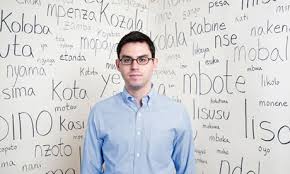 Studies have been conducted which prove the correlation between wealth and the ability for word comprehension in very young children, but how does that translate into adulthood? Do those who have been brought up in low income households find it harder to learn foreign languages than those who have grown up with wealthier families?
Studies have been conducted which prove the correlation between wealth and the ability for word comprehension in very young children, but how does that translate into adulthood? Do those who have been brought up in low income households find it harder to learn foreign languages than those who have grown up with wealthier families?
It’s certainly true that by school age, those who have been raised in low income families have a lower reading ability than their peers and can struggle from the outset. Their social background has not allowed them to reach their full potential for their age group leading to an increased risk of lack of cognitive and educational development.
Nowadays, however, educational institutions recognize these social situations and are able to ensure that pupils are taught accordingly. Teaching techniques and resources are such that pupils from any background are able to learn effectively and will quickly progress to reach their full potential.
A high percentage of low income families in the UK actually speak English as their second language, whilst speaking their native language at home and in their community. In this respect, many children are already familiar with the concept of learning foreign languages and, whilst they may need to apply themselves more than their peers to other academic subjects, they already have the capabilities of being able to grasp foreign languages. Bearing this in mind, for those particular pupils, learning foreign languages as an adult should not pose any issues.
Globalization, interactive social media and innovative teaching techniques with a focus on learning foreign languages means that adults, regardless of their background, educational level, or linguistic capability are more than able to learn foreign languages easily. What languages have you learned and do you think your background positively or negatively affected your ability to learn them?
 Athletes are well known for speaking foreign languages as it helps them when travelling for their sport, and many are actually able to conduct interviews in their second language. Top ranking tennis player, Novak Djokovic, learned German as his third language after practising there and is continuously learning more languages so that he can understand what’s going on around him when he travels, and also to satisfy his love of linguistics. As well as his native French, Arsène Wenger, the manager of Arsenal football club, can speak an incredible five languages including English, German, Italian, Spanish and some Japanese. He strongly believes in the benefits that languages can have in people’s careers and is quick to promote language learning.
Athletes are well known for speaking foreign languages as it helps them when travelling for their sport, and many are actually able to conduct interviews in their second language. Top ranking tennis player, Novak Djokovic, learned German as his third language after practising there and is continuously learning more languages so that he can understand what’s going on around him when he travels, and also to satisfy his love of linguistics. As well as his native French, Arsène Wenger, the manager of Arsenal football club, can speak an incredible five languages including English, German, Italian, Spanish and some Japanese. He strongly believes in the benefits that languages can have in people’s careers and is quick to promote language learning.
A great role model for younger people is the group One Direction who have taken it upon themselves to learn the 20 most common words of the language of each of the countries they’re due to visit whilst on tour. The group made this decision after a trip to Japan which was a huge culture shock for them and became embarrassing during a press conference due to the language barrier; they realized that they needed to give more to their fans than just their musical talents by making an extra effort to communicate with them in their own languages.
Having role models such as actors, musicians and sportspeople to look up to is a great way to be inspired to learn a new language, and they are keen to promote the benefits that speaking another language has had for them. Could you be encouraged by their examples to learn a new language?
 If you aspire to be like your favourite celebrity then you should consider learning a new language; you’d be surprised at how many celebrities are fluent in more than just their native tongue.
If you aspire to be like your favourite celebrity then you should consider learning a new language; you’d be surprised at how many celebrities are fluent in more than just their native tongue.
With a French wife, a house and even his own vineyard in France, it goes without saying that the actor Johnny Depp is fluent in the French language. Likewise, fellow actor Orlando Bloom, whose parents owned a language school in Kent when he was a child, also boasts French as his second language. The actor and stand-up comedian, Eddie Izzard is currently on tour promoting foreign languages in ‘Force Majeure’ where he actually conducts each show in the language of the country he’s currently touring.
Actress Gwyneth Paltrow completed a Spanish exchange trip when she was a teenager and still continues to speak Spanish whenever she can, even co-starring with Antonio Banderas in a Spanish film. Sandra Bullock, whose mother was German, became fluent in the language when she travelled with her mother, an opera singer, on European opera tours as a child and spent time with her aunt and grandmother in Nuremberg and Salzburg. Natalie Portman, on the other hand, can speak a whopping five languages (and is fluent in two of these) including French, German, Spanish, Japanese and Hebrew! Being born in Jerusalem, Israel, with an Israeli father and an American mother, she was lucky enough to become fluent in Hebrew and English at an extremely early age.
Far from just the glamour and hype of their careers, many celebrities are fluent in one, if not more, foreign language and have been able to use them to their advantage both in their careers and their personal lives. Who is your favourite celebrity linguist and how has their story inspired you to learn a new language?
 It’s not just children or pupils in higher education who have the importance of learning foreign languages emphasized upon them. Many career opportunities are available now to those who speak more than one language and even those who have held good positions within their workplace for a long time are now under pressure to learn a new language.
It’s not just children or pupils in higher education who have the importance of learning foreign languages emphasized upon them. Many career opportunities are available now to those who speak more than one language and even those who have held good positions within their workplace for a long time are now under pressure to learn a new language.
Intensive Lessons for Diplomats
Diplomats are now undergoing intensive language lessons in the Foreign Office’s new language centre. Originally closed by the Labour government in 2007 to save costs by outsourcing to language trainers, the new centre – which teaches up to 80 languages – was re-opened by Foreign Secretary William Hague last month. The aim of the Foreign Office is to increase the number of diplomats in positions abroad who can conduct their business in the language of that particular country. The main focus is on Mandarin, Arabic, Spanish, French, Russian and German, with the intention of strengthening diplomatic ties with Latin America, China and the Middle East.
The Language Centre
The new centre will enable diplomats, as well as staff from other government offices, to study languages in intensive one-to-one sessions. Regardless of any previous knowledge of foreign languages, the teaching techniques used and modern facilities available in the comfortable surroundings make it possible for anyone to study any language to a very high standard. Some languages, such as Mandarin, entail learning the language for 22 months with 4 hours of study each day, before the diplomats are ready to take on their ‘operational’ role overseas in which they are expected to be able to hold press conferences in that language. As diplomats are taking on the challenge, 50 new speaking jobs have been created in UK embassies and high commissions, increasing diplomatic relations with other countries.
Have you needed to learn a foreign language for your career or would you consider learning a new language to take your career in a new direction?
 Sporting personality, Gary Lineker, has been promoting the benefits of learning foreign languages. Having learned Spanish after he was assigned to play football for Barcelona FC in 1986, he understands only too well the importance that foreign languages have in people’s lives.
Sporting personality, Gary Lineker, has been promoting the benefits of learning foreign languages. Having learned Spanish after he was assigned to play football for Barcelona FC in 1986, he understands only too well the importance that foreign languages have in people’s lives.
Last month was the European Day of Languages and, in celebration of this, 11 schools in England and Scotland were given the opportunity to improve their linguistic capabilities by being awarded new language training resources. Keen to get involved, Gary Lineker visited one of these secondary schools to interact with the kids and to take part in the discussions there which were based on the necessity for increased language learning in schools.
Most schools across the UK are multinational, with many pupils speaking different languages at home, so why not promote language learning in schools? Technology makes learning more fun and interesting for kids, and schools have many technological resources at their fingertips that their pupils can take advantage of. The new language software awarded to the schools will give the pupils the ability to study using devices such as laptops, tablets and smartphones.
Other sports personalities are also quick to highlight the benefits of being able to speak foreign languages. Olympic medalist, Tom Daly, studied Spanish to A-level and is able to conduct interviews in Spanish, just as Chris Froome conducts interviews for the Tour de France in French. Paula Radcliffe, the world marathon record holder, finds her fluency in French and German very useful for international events. Ellen MacArthur used her knowledge of French to help gain sponsorship for her round-the-world sailing trip. Having role models like these is a great way for pupils to be inspired to learn new languages and to understand the importance of languages for their futures.
Who or what inspired you to learn a language and how has it helped you in your career or lifestyle?
 Does speaking two languages just confuse your brain? Does bilingualism muddle your thoughts and hinder speech in both languages? Well, that used to be the general opinion, especially where children were concerned. On the contrary, we now know that the complete opposite is true, with bilingualism enhancing thought patterns and organizing them into a much clearer format.
Does speaking two languages just confuse your brain? Does bilingualism muddle your thoughts and hinder speech in both languages? Well, that used to be the general opinion, especially where children were concerned. On the contrary, we now know that the complete opposite is true, with bilingualism enhancing thought patterns and organizing them into a much clearer format.
Haven’t you ever sat and listened to someone speaking in two different languages, naturally flicking from one to the other without hesitating, enviously wishing you could do the same? This ability is due to the mental workout being bilingual gives to your brain, training it to be stronger and more flexible. The ability to multi-task, not just with languages, but with all things, becomes very apparent as does the ability for the speaker to edit the languages and information according to who they are speaking with. For example, two bilinguals will often flit between the two languages using the best words or phrases from either language to get their point across. When speaking to someone who only understands one of the languages, however, the bilingual speaker will stick to that language when conversing with them. This ‘language selection’ is a cognitive skill built up from the mental exercises used to speak two languages fluently.
Research has shown that bilinguals can comprehend languages in a different way to monolinguals, concentrating on key words or phrases when reading sentences rather than the whole text. The brain becomes more organized and filters out the relevant information. Bilingual children tend to be better at prioritizing than their peers and adults are much better at multi-tasking. Being bilingual can bolster the brain and helps to protect it from aging issues, such as dementia and Alzheimer’s disease.
Do you have the ability to juggle two languages? Do you find it confusing or are your thoughts very clear and organized?
 Well it seems that 1,000 is the standard number of words we’d need to learn of a foreign language in order to be able to hold a conversation in it. More and more language companies appear to be recommending this level of competency in a foreign language but one organization, Speak to the Future, is taking this a step further.
Well it seems that 1,000 is the standard number of words we’d need to learn of a foreign language in order to be able to hold a conversation in it. More and more language companies appear to be recommending this level of competency in a foreign language but one organization, Speak to the Future, is taking this a step further.
Backed by the British Council, Speak to the Future is on a mission to get Britain talking, albeit in foreign languages. Believing the Brits to be ‘lazy linguists’, the organization feels that using the excuse that English is the most widely spoken language in the world is not good enough in these times of global connectivity.
Believing 1,000 words to be easily achievable by everyone, no matter what their age or how linguistically skilled they are, Speak to the Future has launched a campaign to promote this challenge. They’re not expecting fluency, just the ability to have a simple conversation. With the support of over 30 organizations, their belief is that by learning foreign languages we can
- better understand other cultures
- we can increase the level of education within the UK
- people will have more opportunities within the employment sector as well as socially
- contact with international networks will create innovation and enterprise
- we will benefit by having a greater pool of highly qualified linguists within the UK
- and that we need to act now to increase our standing in globalization.
Have you taken up the challenge? Join in with the campaign and speak up for your future by learning 1,000 words of a foreign language. You might be surprised at the opportunities that suddenly become available to you.
 From a trip to the Congo to study chimpanzees for the National Geographic to a conversation with a pygmy, Joshua Foer is now able to converse in Lingala, the lingua franca of the Congo basin, which he learned in just 22 hours. So how did that happen?
From a trip to the Congo to study chimpanzees for the National Geographic to a conversation with a pygmy, Joshua Foer is now able to converse in Lingala, the lingua franca of the Congo basin, which he learned in just 22 hours. So how did that happen?
During his trip, Joshua stayed with a local tribe, the Mbendjele pygmies, and got to know them with the help of a translator. On his return home, he decided to take a new direction with his career and vowed to visit the tribe again but this time to stay with them and immerse himself completely in their lifestyle and culture. This meant learning the language universally spoken across northern Congo – Lingala – albeit not the first language of the pygmies.
With only a 1963 edition of the US Foreign Service Institute handbook and a scanned copy of the Lingala-English dictionary which consisted on 1,109 words, Joshua used a learning technique to get to grips with the language. Using a combination of mnemonics and an app resembling the fun of online gaming, Joshua was able to learn the 1,000 most common words of Lingala. Over the course of 10 weeks, the total time spent on learning added up to just 22 hours and 15 minutes, with 20 minutes being the longest period he’d spent studying the language at any one time and 4 minutes being the average time.
The trip back to the village showed his linguistic studies to be a success as he was able to converse with the tribe without the aid of a translator. So it just goes to show that you really can learn a language in under 24 hours!
What techniques have you used to help you learn a language? Would you, like Joshua, be up for the challenge of learning a foreign language in such a short space of time?
 If people find ‘back seat’ driving irritating, then ‘back seat’ interpreting is even worse. Costing taxpayers £250,000 each year, the use of interpreters or pre-recorded voice-overs in foreign languages during practical and theory tests has resulted in over 1,000 licences being revoked due to fraud and a number of convictions of interpreters.
If people find ‘back seat’ driving irritating, then ‘back seat’ interpreting is even worse. Costing taxpayers £250,000 each year, the use of interpreters or pre-recorded voice-overs in foreign languages during practical and theory tests has resulted in over 1,000 licences being revoked due to fraud and a number of convictions of interpreters.
The system allows people who speak foreign languages to learn how to drive by choosing from 19 foreign voice-over languages available for the test, or to use an interpreter where their language is not a pre-recorded option. This system, however, attracts fraudsters as learner drivers have been helped to cheat by being covertly coached in the foreign language.
The fraud scandal has led the Secretary of State for Transport, Patrick McLoughlin, to make the decision to scrap all driving tests conducted in foreign languages from early next year with the goal of stopping fraud, boosting safety, cutting costs and enhancing ‘social cohesion and integration’ as the tests will only be available in English or Welsh. He also stated that this requirement will ensure that, on passing their test, all new drivers will be able to understand any emergency information or traffic updates.
The Right Decision?
What are your views of the current language system used by foreign learner drivers in the UK and do you agree or disagree with the decision made for next year’s driving tests?
 Studies have been conducted which prove the correlation between wealth and the ability for word comprehension in very young children, but how does that translate into adulthood? Do those who have been brought up in low income households find it harder to learn foreign languages than those who have grown up with wealthier families?
Studies have been conducted which prove the correlation between wealth and the ability for word comprehension in very young children, but how does that translate into adulthood? Do those who have been brought up in low income households find it harder to learn foreign languages than those who have grown up with wealthier families?







